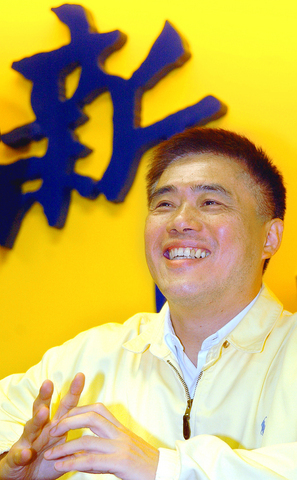Former Environmental Protection Administration (EPA) chief Hau Lung-bin (郝龍斌) announced yesterday that he had decided to return to the Chinese Nationalist Party (KMT) to seek the party's nomination for the Taipei mayoral election.
Hau, a New Party member, resigned as secretary-general of the Red Cross Society in Taiwan on Wednesday to concentrate on the race.
The so-called "four months regulation" -- the KMT's plan to require candidates to have held party membership for at least four months before they can run as a party candidate for a public post -- was the main reason for his decision, Hau said.

PHOTO: LIAO CHEN-HUEI, TAIPEI TIMES
"The four-month regulation did prompt me to make the decision, but it was not the main pressure. The real pressure was the endless inquiries from the media about my intentions," he said during a press conference held at the New Party's headquarters.
Several public opinion polls have ranked Hau as the most popular pan-blue candidate for the Taipei mayor's job.
His decision to join the race could be a big challenge for the other possible pan-blue contenders, who include KMT Legislator John Chiang (
At the press conference, the New Party Chairman Yok Mu-ming (
"Former New Party members such as KMT Legislator Joanna Lei (雷倩) still join our party's events and remain friendly with us ?This is a necessary process for a final merger between the two parties," he said.
While Hau wanted to follow Lei's path and maintain his New Party membership during the campaign, Liao Feng-teh (廖風德), head of the KMT's Organization and Development Committee, said the party did not allow its members to have dual party membership.
KMT Chairman Ma Ying-jeou (
"I welcome all talented people to join the race, but the KMT has its own nomination mechanism, which is for people to join the party first and then participate in the primaries to win the KMT nomination," he said.
Potential pan-blue rivals to Hau differed over his decision to return to the KMT and to enter the Taipei race.
Chiang said that he welcomed and respected Hau's decision to seek the KMT nomination because it was to Taipei's advantage to have many excellent candidates contending for the post.
Chiang emphasized, however, that he has remained loyal to the party for almost 40 years and said that he hoped the party would use a fair and reasonable primary mechanism to pick the most suitable candidate.
KMT Legislator Ting Shou-chung (
PFP Legislator Liu Wen-hsiung (
Independent Legislator Li Ao (
Li said Hau was as "incompetent" as Ma, citing the city's garbage bag scheme as one example of his ineffectiveness.
Li also described the KMT as a "rotten" and "stinky" party and vowed to stay in the Taipei race to show the public that the KMT does not represent the entire pan-blue camp.
Meanwhile, Deputy Mayor Yeh declined to say yesterday whether or not he will run.
Expectations of his candidacy arose after former deputy mayor Ou Chin-der (
"People in the city government, the city council and the grassroots all expected Ou to run" Yeh told the Taipei Times. "I will try to persuade him to join the race, and won't consider running until he says no again."

The Ministry of Economic Affairs has fined Taobao NT$1.2 million (US$36,912) for advertisements that exceed its approved business scope, requiring the Chinese e-commerce platform to make corrections in the first half of this year or its license may be revoked. Lawmakers have called for stricter enforcement of Chinese e-commerce platforms and measures to prevent China from laundering its goods through Taiwan in response to US President Donald Trump’s heavy tariffs on China. The Legislative Yuan’s Finance Committee met today to discuss policies to prevent China from dumping goods in Taiwan, inviting government agencies to report. Democratic Progressive Party Legislator Kuo Kuo-wen (郭國文) said

The Ministry of Economic Affairs has fined Taobao NT$1.2 million (US$36,900) for advertisements that exceeded its approved business scope and ordered the Chinese e-commerce platform to make corrections in the first half of this year or its license would be revoked. Lawmakers have called for stricter supervision of Chinese e-commerce platforms and more stringent measures to prevent China from laundering its goods through Taiwan as US President Donald Trump’s administration cracks down on origin laundering. The legislature’s Finance Committee yesterday met to discuss policies to prevent China from dumping goods in Taiwan, inviting government agencies to report on the matter. Democratic Progressive Party

Taiwan and its Pacific ally Tuvalu on Tuesday signed two accords aimed at facilitating bilateral cooperation on labor affairs, according to Taiwan’s Ministry of Foreign Affairs (MOFA). The governments inked two agreements in Taipei, witnessed by Foreign Minister Lin Chia-lung (林佳龍) and visiting Deputy Tuvaluan Prime Minister Panapasi Nelesone, MOFA said in a news release. According to MOFA, the agreements will facilitate cooperation on labor issues and allow the two sides to mutually recognize seafarers’ certificates and related training. Taiwan would also continue to collaborate with Tuvalu across various fields to promote economic prosperity as well as the well-being of their

Sung Chien-liang (宋建樑), who led efforts to recall Democratic Progressive Party (DPP) Legislator Lee Kun-cheng (李坤城), was released on bail of NT$80,000 today amid outcry over his decision to wear a Nazi armband to questioning the night before. Sung arrived at the New Taipei District Prosecutors’ Office for questioning in a recall petition forgery case last night wearing a red armband bearing a swastika, carrying a copy of Adolf Hitler’s Mein Kampf and giving a Nazi salute. Sung left the building at 1:15am without the armband and covering the book with his coat. Lee said today that this is a serious